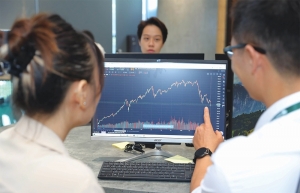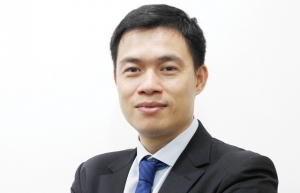How supply and demand support the fund market in Vietnam
Many factors in the present investment climate are contributing to the redirection of cash flow towards investment avenues such as fund certificates. Considering the broader perspective, this transition appears to be both reasonable and inevitable for the growth of financial markets, particularly in Vietnam.
 |
| Dr. Na Sung Soo, CEO of Vina Securities |
Vietnam is a developing country with a dynamic economy and positive income growth for its citizens in the past decades. With a high proportion of the young population and increasing incomes, the demand for financial investment and the use of investment tools such as fund certificates is also expected to rise.
Consequently, the fund management sector and related services are poised for significant growth, especially given the modest current scale.
According to the year-end 2023 report from the Vietnam Securities Depository and Clearing Corporation, as of September 2023, there were 105 licensed securities investment funds operating in the market, with a total net asset value reaching nearly $3 billion, a 4 per cent increase compared to the end of 2022.
The total net asset value of the new securities investment funds accounts for a tiny proportion of GDP, at 2.44 per cent, much lower than countries in the region such as Thailand and Malaysia, where it has reached 30 per cent of GDP.
The number of investors participating in new fund certificates reached 250,000, accounting for 0.25 per cent of the population, significantly lower than other countries in the region. This figure is small compared to the 7.35 million securities accounts held by individual investors as of the beginning of 2024.
Alongside efforts to upgrade the stock market and develop the financial market, the State Securities Commission has announced its intention to continue researching ways to alleviate difficulties for businesses operating in the fund sector. This includes reviewing and refining the legal framework governing the fund industry to align with international norms and practices in Vietnam.
Specifically, the research will focus on diversifying types of securities investment funds, integrating digital transformation into the fund sector, diversifying distribution channels for fund certificates by international practices, and simultaneously controlling and managing risks in fund management operations during this new era marked by rapid advancements in IT.
South Korean example
Developments in the Vietnamese market bear similarities to those in South Korea, and the experiences gained from the development of fund management and related services in major markets like South Korea can serve as valuable reference material for Vietnam.
The most significant similarity between the financial markets of Vietnam and South Korea lies in the role of individual investors. In South Korea, individual investors play a substantial role in driving the stock market, accounting for up to 65 per cent of transactions according to 2023 data.
Similarly, in Vietnam, since the onset of the pandemic, there has been a significant increase in the number of new accounts opened by individual investors, and transactions by individual investors have become increasingly pivotal in the market's development.
However, the two markets also have differences. In South Korea, the fund market has developed over many years, resulting in a wide variety of fund products, including exchange-traded funds (ETFs) investing in foreign markets or real estate funds. ETFs are particularly favoured by individual investors in South Korea.
In Vietnam, due to the smaller market size, the variety of investment fund types is not as diverse. Currently, there are only a few fund products focused on fixed income, such as bond funds and equity funds.
This leads to individual investors having limited options that match their risk appetite and profit goals. Additionally, efforts in communication and raising community awareness about investment fund products, as well as fund management services, have yet to be conducted vigorously enough to help individual investors better understand the advantages of this investment channel.
Furthermore, distribution channels are also limited. Investors primarily trade fund certificates through the channels of securities companies and the proprietary platforms of fund management companies.
So, how has the fund market developed in South Korea? Several factors have contributed to the explosive growth of the fund certificate market in South Korea. Firstly, diverse distribution channels have played a crucial role in facilitating individual investors' access to and trading fund certificates across multiple channels.
In South Korea, there are various distribution channels for fund certificates, with banks and securities companies being the two main channels. Any individual investor can easily access and trade fund certificates through securities companies or banks, leveraging online trading systems.
Rising participation
Furthermore, reputable financial institutions (comprising securities firms and asset management funds) also aid investors in accessing information about fund certificates more conveniently by developing online platforms that provide comprehensive details about various funds such as performance, fees, and charges. Additionally, fund management companies in South Korea also implement regular market orientation and education strategies.
The range of fund products in South Korea is quite diverse, with a considerable number of funds available. For instance, in the case of ETFs, as of the end of August 2023, there were over 1,130 ETFs in South Korea with a total asset value of approximately $90 billion.
In recent years, individual investors have shown increased interest in theme-based investment products. This could also serve as an idea for fund management companies in Vietnam to implement, aiming to pull in more investor attention.
Turning back to the Vietnamese market, traditionally, Vietnamese individuals primarily invested their idle funds in traditional assets such as gold, real estate, or deposits in banks. However, there has been a noticeable trend of individuals diversifying their investment channels into other financial assets such as bonds, and stocks.
The increasing participation of new investors in the financial market has generated a significant demand for experts to manage assets. Fund products are particularly suitable for this growing group of new investors.
In parallel, fund management companies are intensifying their collaboration with securities firms to diversify distribution channels. More efforts are being made in fund promotion through continuous communication programmes, and fund distribution applications are becoming increasingly convenient.
Some products such as retirement funds and thematic funds like environmental, social, and governance funds are beginning to be developed.
Fund management companies have also expanded their product offerings, with the standout being the Systematic Investment Plan, which optimises the average price of fund certificates, avoiding buying at peak prices and selling at low points, especially for equity funds prone to market volatility. The emergence of specialised platforms for distributing fund certificates will further facilitate investors in managing multiple funds on the same platform.
These developments serve as growth drivers for the overall stock market and particularly for fund investment. Currently, both supply and demand sides are favourable for the development of the fund market. Therefore, I anticipate that the Vietnamese fund market will continue to experience robust growth.
 Stock market shows potential for growth Stock market shows potential for growth |
 How to build upon market dynamics How to build upon market dynamics |
 Weighting stock market prospects Weighting stock market prospects |
What the stars mean:
★ Poor ★ ★ Promising ★★★ Good ★★★★ Very good ★★★★★ Exceptional
Related Contents
Latest News
More News
- Raised ties reaffirm strategic trust (February 20, 2026 | 14:06)
- Sustained growth can translate into income gains (February 19, 2026 | 18:55)
- The vision to maintain a stable monetary policy (February 19, 2026 | 08:50)
- Banking sector faces data governance hurdles in AI transition (February 19, 2026 | 08:00)
- AI leading to shift in banking roles (February 18, 2026 | 19:54)
- Digital banking enters season of transformation (February 16, 2026 | 09:00)
- IFC to grant $150 million loan package for VPBank (February 13, 2026 | 09:00)
- Nam A Bank forms position as strategic member at VIFC through three key partnerships (February 12, 2026 | 16:39)
- Banks bolster risk buffers to safeguard asset quality amid credit expansion (February 12, 2026 | 11:00)
- VNPAY and NAPAS deepen cooperation on digital payments (February 11, 2026 | 18:21)

 Tag:
Tag:



















 Mobile Version
Mobile Version